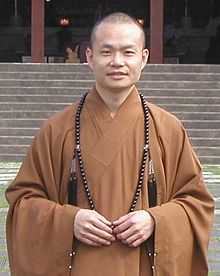Hsin Pei
| Hsin Pei | |
|---|---|
 | |
| School | Ch'an |
| Lineage | Linji |
| Hui Han | |
| Personal | |
| Born |
March 13, 1970 Penghu County, Republic of China |
| Senior posting | |
| Title | Most Venerable |
| Predecessor | Hsin Ting |
| Successor | Hsin Bao |
| Religious career | |
| Teacher | Hsing Yun |
Hsin Pei (Chinese: 心培和尚; pinyin: Xīnpéi Héshàng; Pe̍h-ōe-jī: sim-pôe hô siōng; born March 13, 1970) was the seventh and eighth term abbot and director of the Fo Guang Shan Buddhist Order.[1] The youngest abbot ever elected to the order, Hsin Pei was elected by the members of Fo Guang Shan worldwide in 2004 and succeeded retiring abbot Hsin Ting in 2005. As abbot of the Order, Hsin Pei is the second highest monastic in the order, and is second in line to the position of head teacher. After his preceptor, Venerable Master Hsing Yun who is a forty eighth generation lineage holder of the Linji Chan School, Hsin Pei and his predecessor Hsin Ting are the forty ninth generation lineage holders.
His term ended in March 2013. Hsin Pei currently resides in the United States in order to improve his English.[2]
Personal life
Hsin Pei was born in Penghu in a rural Buddhist family. He was the youngest of three sons, and also has a younger sister. His eldest brother is also a Buddhist practitioner, and his second eldest brother ordained as Ven. Hui Jih in his twenties under Master Hsing Yun, which inspired Hsin Pei to also ordain as well. His younger sister later became a Buddhist nun in the same order. The two sons of Hsin Pei's eldest brother have also joined the monastic order in their teens.
In 1990, Hsin Pei was fully ordained as a Buddhist monk. At that time he was given the Dharma name Hui Han (慧瀚; Hanyu Pinyin: Huihan).
Monastic life
Prior to his election as abbot, Hsin Pei was in charge of discipline action at Fo Guang Shan's main Bei Hai Buddhist College, as well as administration at the Male Buddhist University at the main monastery in Kao Hsiung County in southern Taiwan. He was also the assistant director of the Fo Guang Shan Chán Center, his elder brother Ven Hui Jih having formerly been in charge of practice there. He is very well-versed in the tradition of Chinese Buddhist precept ceremonies, from the five precepts, the eight one-day fasting precepts, short-term monastic retreats, and full ordination ceremonies. As the former Discipline Officer (Ch: 糾察 Jiucha) of the monastery, he is expert in all the rules and regulations of the monastery. He has many times assumed the post of presiding in precept ceremonies and short-term monastic retreats.
Hsin Pei is often described in the order as modest in conduct, showing self disciplinary skills and adherence to the precepts. Because of his young age, he is often seen as a role model to younger generation of Buddhists, guiding and helping younger monastics and laity. He also excels in the chanting of Buddhist music and often has led the Fo Guang Shan Buddhist Monastic Choir to perform on the world stage and has won many high praises. In recent years, Hsin Pei has reached new heights with his performances in the "Sounds of the Yellow River", an album of Buddhist chanting recorded by the Fo Guang Shan monastic choir. This Buddhist liturgical music has become some of the standards for modern Chinese liturgy worldwide.
Name
After being elected Chairman of the Fo Guang Shan Religious Affairs Board, more commonly known as the "Chief Abbot" of Fo Guang Shan worldwide, that the then-Ven. Hui Han began to use the Dharma name Most Venerable Hsin Pei. This follows a tradition established by the former abbots of Fo Guang Shan, Hsin Ping and Hsin Ting whereby rather than using one's Dharma name, the abbot uses their "inner name" instead. All the monastics ordained in Fo Guang Shan also have an inner name which begins with the character "Xin" (心) meaning "heart" or "mind".
References
- ↑ "Volunteers cleanse Buddha and selves". Taipei Times. December 29, 2010. Retrieved 27 February 2011.
- ↑
| Buddhist titles | ||
|---|---|---|
| Preceded by Hsin Ting |
Abbot and Director of Fo Guang Shan 16 January 2005 – 12 March 2013 |
Succeeded by Hsin Bao |
| ||||||||||||||||||||||||||||||||||||||||||||||||||||||||
| |||||||||||||||||